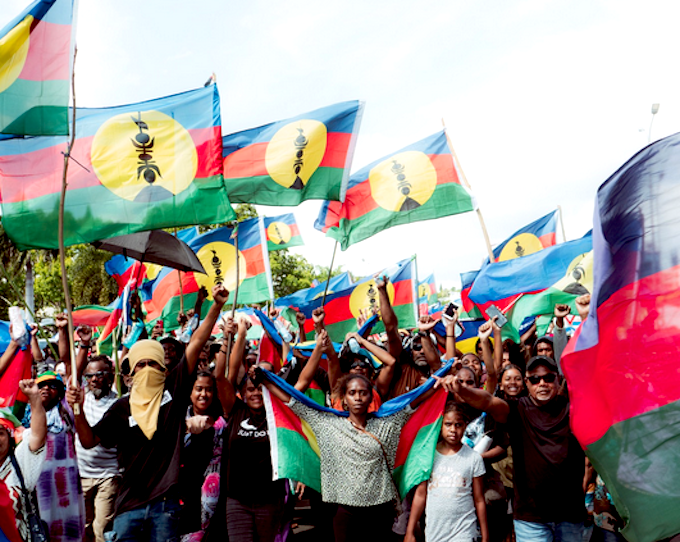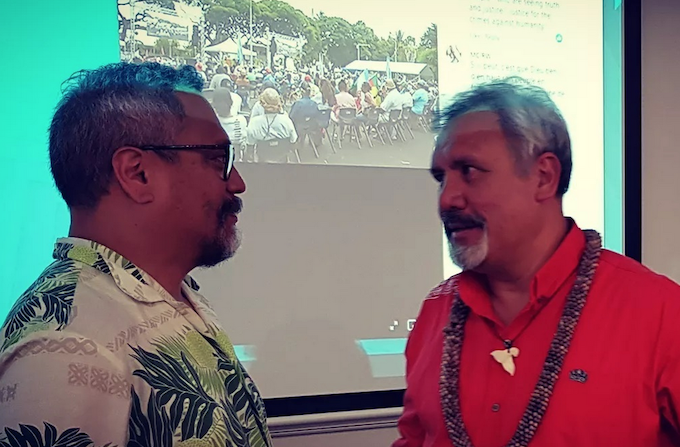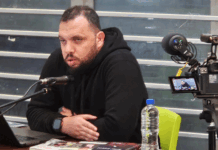
COMMENTARY: By Teanau Tuiono
There is an important story to be told behind the story Aotearoa New Zealand’s mainstream media has been reporting on in Kanaky New Caledonia. Beyond the efforts to evacuate New Zealanders lies a struggle for indigenous sovereignty and self-determination we here in Aotearoa can relate to.
Aotearoa is part of a whānau of Pacific nations, interconnected by Te Moana-nui-a-Kiwa. The history of Aotearoa is intricately woven into the broader history of the Pacific, where cultural interactions have shaped a rich tapestry over centuries.
The whakapapa connections between tangata whenua and tagata moana inform my political stance and commitment to indigenous rights throughout the Pacific. What happens in one part of the South Pacific ripples across to all of us that call the Pacific Ocean home.
- READ MORE: Kanaky New Caledonia unrest: Macron lifts state of emergency ‘for time being’
- French repressive policies in New Caledonia have ‘betrayed’ Kanak hopes — David Robie video
- Amid Kanaky New Caledonia’s unrest, I saw first-hand the same colonial white privilege that caused it
- West Papua independence group slams French ‘modern-day colonialism’
- Other Kanaky New Caledonia reports
Since the late 1980s the Kanak independence movement showed itself to be consistently engaging with the Accords with Paris process in their struggle for self-determination.
The Nouméa Accord set out a framework for transferring power to the people of New Caledonia, through a series of referenda. It was only after France moved to unilaterally break with the accords and declare independence off the table that the country returned to a state of unrest.
Civil unrest in and around the capital Nouméa which has continued for two weeks, was prompted by Kanak anger over Paris changing the constitution to open up electoral rolls in its “overseas territory” in a way that effectively dilutes the voting power of the indigenous people.
Coming after the confused end of the Nouméa Accord in 2021, which left New Caledonia’s self-determination path clouded with uncertainty, it was inevitable that there would be trouble.
Flew halfway across world
That France’s President Emmanuel Macron flew across the world to Noumea last week for one day of talks in a bid to end the civil unrest underlines the seriousness of the crisis.
But while the deployment of more French security forces to the territory may have succeeded in quelling the worst of the unrest for now, Macron’s visit was unsuccessful because he failed to commit to pulling back on the electoral changes or to signal a meaningful way forward on independence for New Caledonia.

Paris’ tone-deafness to the Kanaks’ concerns was evident in its refusal to postpone the last of the three referendums under the Nouméa Accord during the pandemic, when the indigenous Melanesians boycotted the poll because it was a time of mourning in their communities. Kanaks consider that last referendum to have no legitimacy.
But Macron’s government has simply cast aside the accord process to move ahead unilaterally with a new statute for New Caledonia.
As the Kanaky Aotearoa Solidarity group said in a letter to the French Ambassador in Wellington this week, “it is regrettable that France’s decision to obstruct the legitimate aspirations of the Kanak people to their right to self-determination has led to such destruction and loss of life”.
Why should New Zealand care about the crisis? New Caledonia is practically Aotearoa’s next door neighbour — a three-hour flight from Auckland. Natural disasters in the Pacific such as cyclones remind us fairly regularly how our country has a leading role to play in the region.
But we can’t take this role for granted, nor choose to look the other way because our “ally“ France has it under control. And we certainly shouldn’t ignore the roots of a crisis in a neighbouring territory where frustrations have boiled over in a pattern that’s not unusual in the Pacific Islands region, and especially Melanesia.
There is an urgent need for regional assistance to drive reconciliation. The Pacific Islands Forum, as the premier regional organisation, must move beyond words and take concrete actions to support the Kanak people.
Biketawa Declaration provides a mechanism
The forum’s Biketawa Declaration provides a mechanism for regional responses to crisis management and conflict resolution. The New Caledonian crisis surely qualifies, although France would be uncomfortable with any forum intervention.
But acting in good faith as a member of the regional family is what Paris signed up to when its territories in the Pacific were granted full forum membership.
Why is a European nation like France still holding on to its colonial possessions in the Pacific? Kanaky New Caledonia, Maohi Nui French Polynesia, and Wallis & Futuna are on the UN list of non-self-governing territories for whom decolonisation is incomplete.
However, in the case of Kanaky, Paris’ determination to hold on is partly due to a desire for global influence and is also, in no small way, linked to the fact that the territory has over 20 percent of the world’s known nickel reserves.
Failing to address the remnants of colonialism will continue to devastate lives and livelihoods across Oceania, as evidenced by the struggles in Bougainville, Māo’hi Nui, West Papua, and Guåhan.
New Zealand should be supportive of an efficient and orderly decolonisation process. We can’t rely on France alone to achieve this, especially as the unrest in New Caledonia is the inevitable result of years of political and social marginalisation of Kanak people.
The struggle of indigenous Kanaks in New Caledonia is part of a broader movement for self-determination and anti-colonialism across the Pacific. By supporting the Kanak people’s self-determination, we honour our shared history and whakapapa connections, advocating for a future where indigenous rights and aspirations are respected and upheld.
Kanaky Au Pouvoir.
Teanau Tuiono is a Green Party MP in Aotearoa New Zealand and its spokesperson for Pasifika peoples. This article was first published by The Press and is republished by Asia Pacific Report with the author’s permission.











































